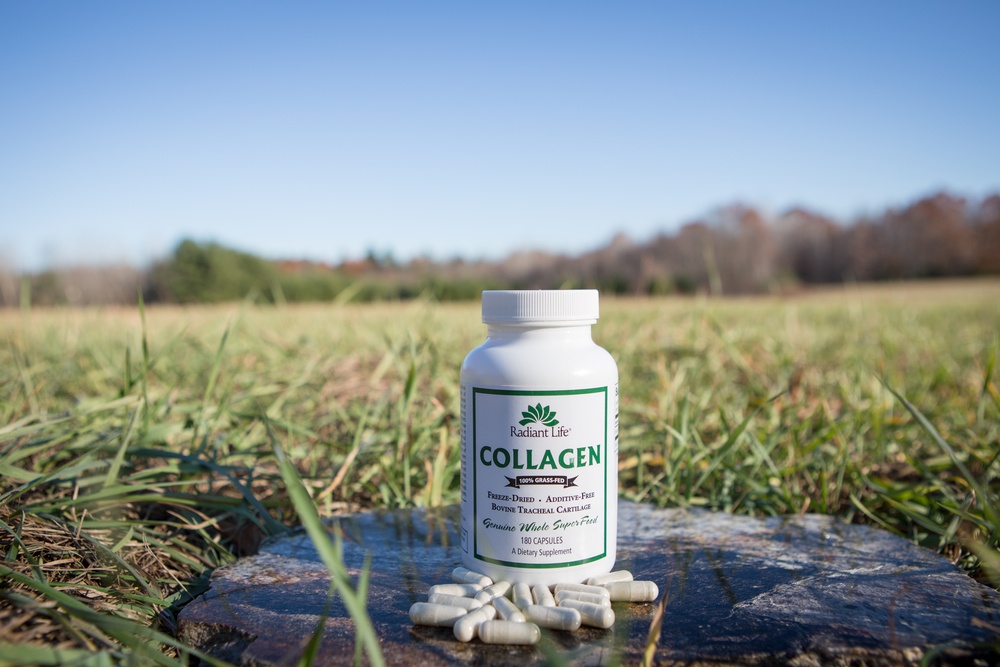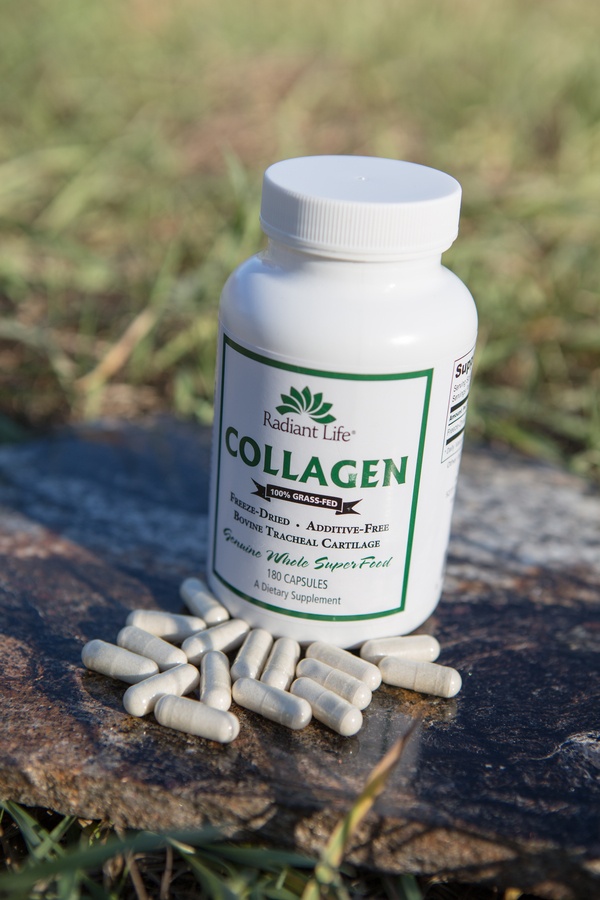Collagen has become a hot topic these days. It has been given credit for aiding in everything from boosting hair, skin, and nail health, to healing “Leaky Gut”, and even improving overall cardiovascular health, to name a few. So why all the hype?

Collagen is a long chain amino acid composed of the individual amino acids Proline, Hydroxyproline, Glycine, and Arginine. It is the most abundant protein in the body, making up 30% of the total protein in the body, and 70% of the total protein in the skin! Collagen gives elasticity to our skin, prevents our hair from splitting and breaking, and provides cushion to bones, tendons, and ligaments in our body. Because of collagen we can move around, bend, and stretch with ease, and maintain a youthful, vibrant look. (1)
So why then does our skin start to sag, our foreheads begin to wrinkle, and our joints become stiff and ridged, making it hard to get up and down and move about like we once did? Well, as our bodies age, they have a harder and harder time producing collagen of their own. Other things like sun exposure also break down the collagen in our skin, causing it to look dull and worn. Because of this, supplementing with collagen can be a huge help to many different functions throughout the body. Let’s take a look at three of those benefits today. (2)
The first, and probably the most widely known benefit collagen has is to the hair, skin, and nails. As I just stated, collagen production begins to slow and break down after about the age of 25… yikes! Many of us reading this blog post have probably hit that point in our lives and may be noticing a few unwanted wrinkles, stretch marks, and sags, all brought on largely by a lack of collagen in the skin. The good news is, by taking a daily dose of collagen supplement, that elasticity and youthfulness can be restored. Collagen is also highly moisturizing to the skin, and helps the cells to repair and renew naturally. (3)
Collagen protein is also the building block of you hair and nails, so if you notice weak or brittle nails, or dullness and loss of hair, a lack of collagen may be to blame. A study in the “Journal of Investigative Dermatology” states that by adding collagen back into your diet, you may even be able to reverse hair loss. “These findings highlight the essential relationships between extracellular matrix (ECM) and hair follicle regeneration, and suggest that collagen VI could be a potential therapeutic target for hair loss and other skin-related diseases.” (4)
Another great use for collagen is to repair and heal intestinal permeability or “Leaky Gut.” With the rise in processed foods, additives, and so many other harmful molecules in food today, digestive issues stemming from a leaky gut have become a big problem. Did you know that 80% of our total immunity resides in our gut? Because of this, it is so crucial that we keep our gut healthy and strong! When our intestines become permeable or “leaky”, food particles and other unwanted substances could slip through into the bloodstream causing major inflammation, food allergies, autoimmune diseases and more. Consuming collagen can be immensely helpful as it aids in breaking down proteins and soothes the mucosal lining of the intestines, calming inflammation. Collagen contains the amino acids proline and glycine and can also help form new connective tissue, all of which is able to actually repair the gut by healing and sealing the intestinal walls. (5,6)
Lastly, Collagen may also be a big help to those who suffer from cardiovascular disease, as well as those just looking for an overall cardiovascular system boost. According to the Journal of the American College of Cardiology, “collagen is essential in maintaining the health and maintenance of cardiac tissue, and may be an important indicator of overall heart health.” Collagen is also linked with the prevention of arteriosclerosis, which is a hardening of the arteries. The amino acid proline aids in releasing fat buildup from the artery walls into the bloodstream. Proline also helps to repair elasticity of the arterial walls, making them softer and more flexible, thus allowing more oxygen rich blood to flow freely to and from the heart. (7,8)
The amino acid Arginine, also found in Collagen, contributes to overall cardiovascular health as Arginine helps with nitric oxide production, enabling better vasodilation. In other words, by incorporating more collagen in your diet, and thus Arginine, a widening of the arteries can occur, as well as muscle relaxation, allowing for better circulation of blood from the heart throughout the body.
The wonderful benefits of collagen are endless, and still so many more could be written about. Who knows, maybe someday in the future there will be a part two to this post! But before you go running out to buy just any collagen, I want to close by stressing the importance of the source and the quality.
Just like with anything else, it is important to know where your food and supplements are being sourced. Otherwise, not only may you not reap the expected benefits, but also you could be unknowingly hurting your body by ingesting less than stellar ingredients. Because collagen is made usually from bovine hide, or cows hide, it is important to make sure the cows are pasture raised, and not fed GMO corn, or other feeds. Recently, Radiant Life came out with our own line of Collagen, and is pleased to share that it is made “directly from the cartilage of healthy, grass-fed, free-range cattle.” A bonus with Radiant Life Collagen is that it is largely made up of bovine tracheal cartilage, rather than just the hides, providing a good source of Type II Collagen – the kind that repairs and cushions joints, bones, and tendons.

